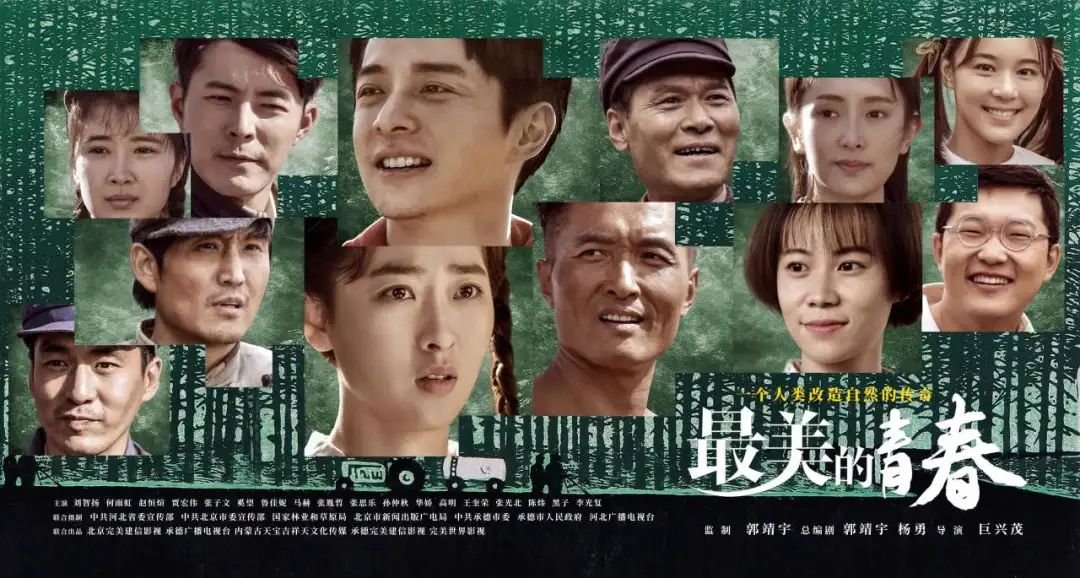
The TV series "The Most Beautiful Youth," written by Guo Jingyu and Yang Yong, directed by Ju Xingmao, and starring Liu Zhiyang, He Yuhong, and others, has won the Excellent TV Series Award at the 32nd China TV Drama Feitian Awards. The show is based on the touching stories of three generations of builders from the Saihanba Forest Farm over the past half century. It tells the story of young entrepreneurs represented by Feng Cheng and Qin Xuemei, who actively responded to the call of their country, using their youthful passion to write a green legend of transforming wasteland into forest sea.
The China Television Art Committee (hereinafter referred to as "the Committee") held an expert seminar shortly after the premiere of the show. The meeting summary is now being redistributed to analyze and interpret how the creators and experts articulated the creation's themes, narrative depth, character portrayals, and artistic expression, transforming the "Saihanba Spirit" into an aesthetic and artistic representation, thereby making the main melody works resonate more deeply with the audience.

Creator Insights
Slow and Steady: Practicing and Conveying the "Saihanba Spirit"
● Guo Jingyu, Producer and Chief Screenwriter of "The Most Beautiful Youth"
The filming of this series was very challenging. In order to find an environment that matched the 1950s and 60s, the crew did extensive work to authentically restore the early days of our country's development. We filmed these 36 episodes over six months, with all actors fully committed and not overlapping other projects. Through this production, we understood how much effort it takes to achieve meaningful results. I hope this series can mark the beginning of a return to authenticity in the industry and help eliminate negative trends.

● Liu Zhiyang, Lead Actor in "The Most Beautiful Youth" and the character "Feng Cheng"
This shoot lasted 162 days, spanned three seasons, and took place in eight different locations. A sense of responsibility and mission pushed me to persist. Through Feng Cheng’s perspective, I witnessed the transformation of Saihanba from desolation to a forest sea. The 369 pioneers of afforestation created a miraculous change in nature with unbelievable belief, youth, and life, which crystallized into the Saihanba Spirit. We are the witnesses and recreators of this legend, using the stories of the Saihanba people to inspire ourselves and convey the Saihanba Spirit to more people.

● He Yuhong, Lead Actor in "The Most Beautiful Youth" and the character "Qin Xuemei"
The story of Saihanba is not far from us. As a young person in the new era, I have enjoyed many comforts; however, the daily struggle against nature during filming has unknowingly infused me with the Saihanba Spirit. Particularly, the director's unwavering enthusiasm for work has motivated me to persevere and has been a tremendous learning experience. We should cherish the rich achievements of several generations’ hard work and strive to do more meaningful things for society.
Expert Opinions
Rooted in Realism, Enriching the Theme of Main Melody
● Zhong Chengxiang, Member of the Chinese Academy of Arts and Famous Art Critic
If "The Song of Youth" and its adapted film were the youthful anthem of the Chinese nation under the leadership of the Communist Party of China during that era, I can confidently say that today’s "The Most Beautiful Youth" is the youthful anthem of the People's Republic of China. "The Most Beautiful Youth" inherits the red gene, holding deep emotions for the Communist Party of China, effectively aestheticizing and artisticizing the Saihanba Spirit, combining spiritual depth with cultural connotation. It is a work that harmoniously unifies thought and art.

● Li Jun, Renowned Art Critic and Planner of the Series
"The Most Beautiful Youth" dispels the superficiality often seen on television; it values simplicity over fashion, authenticity over ostentation, and contribution over possession. This series represents a victory for the spirit of realism on the TV screen. There are no preachy moments; rather, it utilizes top-notch artistic appeal to support the expression of mainstream values and the Saihanba Spirit, allowing them to emerge through clever plot setups and natural character portrayals, providing the audience with an unprecedented experience. By shaping characters who actively challenge hardship, tackle difficulties, dare to innovate, and fearlessly sacrifice, it demonstrates what "the most beautiful youth" truly is.
● Fan Yongge, Deputy Director of the Film and Television Culture Committee of the China Writers Association
Three essential factors for a quality drama: first, the ability to grasp and master the overall subject matter to distill themes that resonate with contemporary relevance and spiritual guidance; second, having a well-structured story that supports the theme, avoiding hollow preachiness; third, a strong collaborative creative team. "The Most Beautiful Youth" possesses these three factors, passionately conveying pure and poetic emotions to the audience, achieving a touching realm. It cultivates an aesthetic vision through a documentary style, enriching the connotation of mainstream dramas and recovering the dignity of television drama.

Realistic Characterization Elevates Artistic Themes
● Luo Jianhui, Vice President of the China Network Audio-visual Program Service Association
"The Most Beautiful Youth" excels in expressing genuine emotions, serving as a youth anthem for the young people of the 1950s and 60s, striving to reflect the essence of the Saihanba Spirit. It does not confine itself to the choice of stories and scenes but breaks free from the limitations of adapted true stories. The director focuses on character portrayal, creating nuanced and realistic depictions that not only drive the plot development but also showcase the Saihanba Spirit, leaving a deep impression.
● Yin Hong, Former Director of Tsinghua University’s Film and Television Communication Center
Everyone has a personal history; one significant issue with many heroic films is the lack of individual histories. In "The Most Beautiful Youth," the characters have accurate personality designs, vividly presenting each individual's history to the audience, which animates the characters and allows their actions to unfold naturally and logically, further elevating the show’s theme through their growth and transformation.

● Zhang ZhiHua, Professor at Beijing Normal University’s School of Media and Arts
In the series, Feng Cheng recites two lines from Ai Qing’s poem: “Why do tears often fill my eyes? Because I love this land deeply.” His performance is incredibly natural and closely integrated with the storyline, exuding great emotional power. In such a harsh environment, demonstrating the beauty and poetry of the drama is impossible without a lofty personal strength. I believe that Feng Cheng could not survive in this setting without this spirit, and these two lines encapsulate both his spiritual strength and the theme of the show.

● Gao XiaoLi, Former Director of Arts Department at "Literary Journal"
This series stands out for its authenticity, simplicity, and immersion in everyday life. From the constructed real scenes, costumes, props, dialogue, to character development, it adheres to the principles of realism without exaggeration or fabrication. Instead, it offers the audience a unique experience by creating an unfamiliar scenario through “a tree, a dog, a wasteland, a person,” employing symbolism and analogies, demonstrating a high level of conscious literary pursuit and strong emotional resonance with profound implications.

Resonating with Contemporary Themes and Conveying a Spirit of Dedication
● Chen Chaoying, Former Director of the Research Department of the China Television Art Committee
"The Most Beautiful Youth" is the anthem of youth during the construction period, a triumphant song for those who strive. Behind the story, the series embodies a spirit of dedication, with characters clearly marked by the values of their time. Today, we need this spirit of devotion more than ever.
● Dai Qing, Professor at the School of Drama and Film at Communication University of China
The emergence of "The Most Beautiful Youth" is "timely"; while it tells stories from the 1950s and 60s, its transcendently timely environmental awareness offers profound insights to society and showcases thoughtful reflections from Chinese television dramas to the world. As a work celebrating the 40th anniversary of reform and opening up, its leading mainstream values imprint a deeper cultural confidence on original works, making film and television creations more vibrant.


